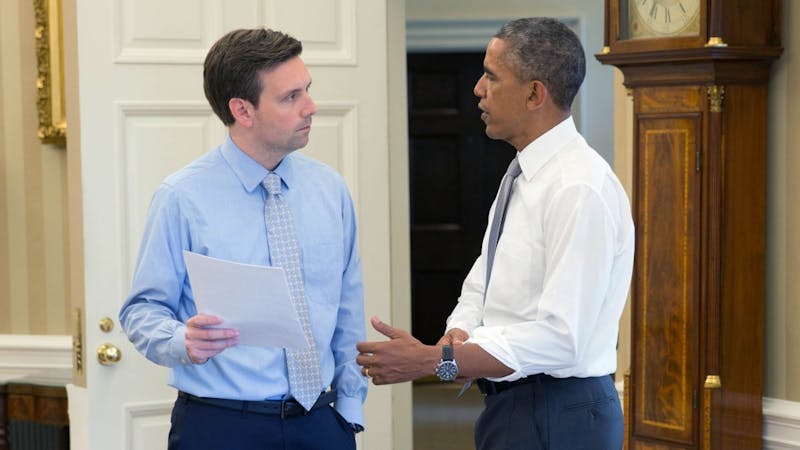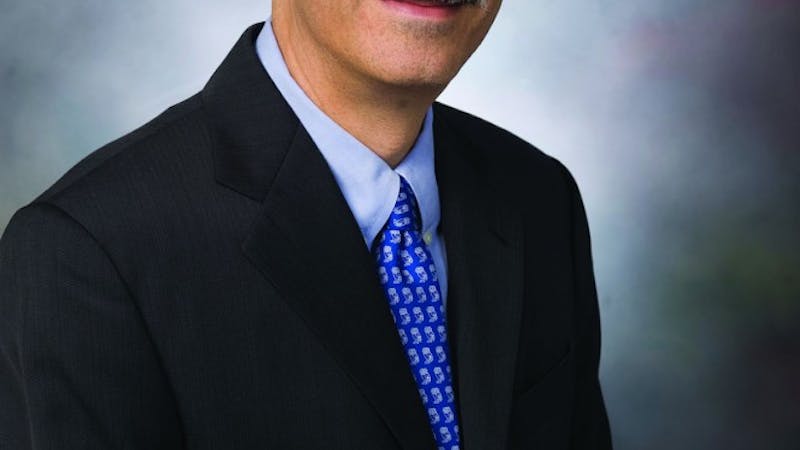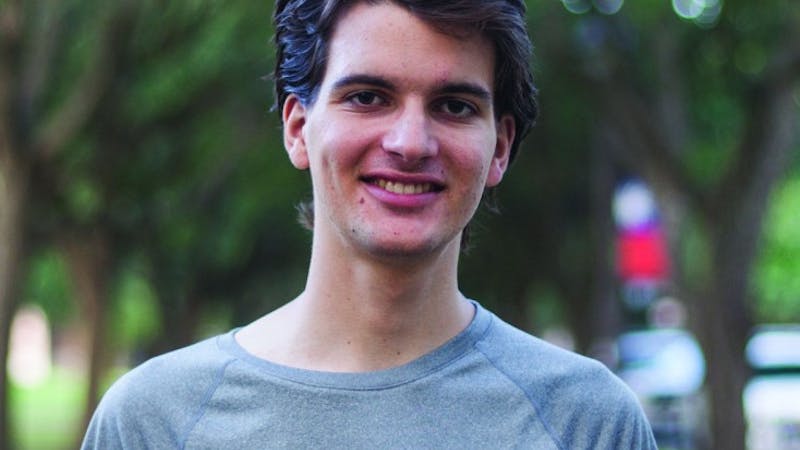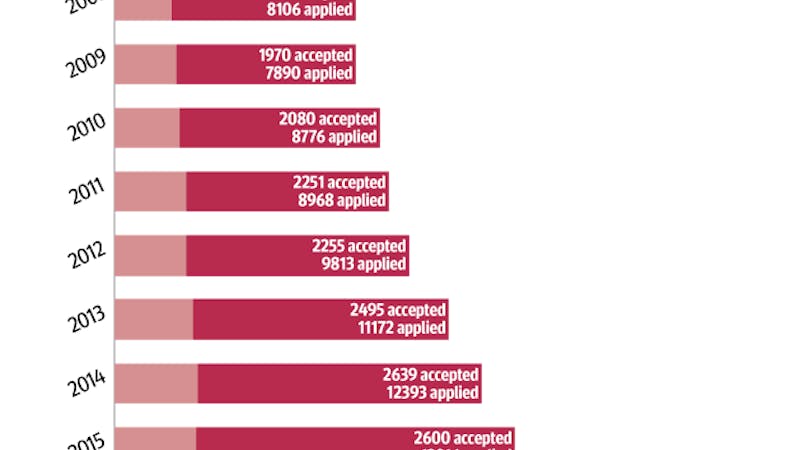NEWS
4/8/15 5:06pm
 By Tina Nazerian
By Tina Nazerian
When Josh Earnest first moved from Houston to Washington, D.C. in January 2001, he spent about six weeks sleeping on the floor of a friend’s spare bedroom.He had no job prospects, only a few contacts and friends and had left the life he had known since graduation — working in politics in Houston.What he found, however, were new possibilities.“I drove here from Houston,” Earnest (Sid Richardson ‘97) said. “And I still remember driving around town and even driving in front of the White House at that point sort of thinking about how what a tremendous experience and honor it would be to work at the White House.” Now, as White House press secretary, the 40-year-old Kansas City, Missouri native wakes up early to prepare for the White House’s daily press briefings, where he answers reporters’ questions about both the administration and its reaction to current events. Meetings pack his mornings, such as a 7:45 a.m. meeting with senior White House staff during which he asks them questions about news he had read about the night before.“It’s an opportunity for me to … ask the national security advisor or the president’s top homeland security advisor about news that occurred overnight that’s related to national security,” Earnest, dressed in a dark suit and green tie, said in his West Wing office. Earnest said he received thorough academic training and learned a lot about writing as a political science and policy studies major at Rice. His extracurriculars included some writing for the Thresher and serving as campus-wide Beer Bike coordinator. “My Rice experience ... genuinely broadened my horizons,” Earnest said.During his senior year, Earnest took a course that sent him to Israel and Gaza for spring break. In Jerusalem, he went to a memorial dedicated to the Holocaust’s lost children at Yad Vashem, Israel’s Holocaust museum. In Gaza, Earnest visited locals and learned about the territory’s public health conditions when he went to a center for deaf children. One of his first times overseas, the trip deeply impacted him. “I learned a lot about [the Israeli-Palestinian] situation, and it continues to form the basis of a lot of my knowledge about that situation that I draw upon in the context of this job in particular,” Earnest said.However, Earnest did more than just advance his knowledge of public policy and politics in and out of the classroom. His favorite memory at Sid Richardson College was going to what used to be an annual early-winter “tower party,” in which every floor would have a different theme, such as a piano bar theme or a country western theme. Prior to being named White House press secretary, Earnest’s jobs included being then-Senator Barack Obama’s Iowa communications director and working for Jay Carney, now his predecessor, as the principal deputy press secretary. “I wouldn’t say that every step of my career has been easy, by any means,” Earnest said. “But I don’t think there’s anything that I regret.” Earnest’s ascent to the press secretary position became a real possibility when Carney left the White House. Very few people knew Carney was stepping down. “I had been involved in an interview process that had only involved a small number of people,” Earnest said. Right before he found out he got the job, which he assumed on June 20, 2014, Earnest was in the middle of an energetic discussion in his office with Jonathan Karl, the chief White House correspondent for ABC News. Brian Mosteller, one of the president’s assistants, opened his office door and told him he was needed upstairs, not wanting to say the president wanted to see Earnest in front of the reporter. Earnest asked Mosteller if he needed to come up immediately, and Mosteller said he did. As Karl started to leave the office, so did Earnest. Earnest, who was not wearing his suit jacket, had taken one step out of his office when Mosteller looked at him and said, “Don’t you think you should put on your suit jacket?” “I thought, oh, yeah, I guess I probably should,” Earnest said. “So I reached for my jacket, and went into the Oval Office and had a conversation with the president, where he offered me the job.”After Earnest returned to his office, he saw that he had missed calls from his wife, Natalie Wyeth, who was then six months pregnant with their first child. She was dealing with an air conditioning repairman at their new townhouse in Alexandria, Virginia. “I called her back, and I said — she obviously knew what was going on — and I said, sweetheart, I’m sorry I wasn’t here to take your calls, but I have the best possible excuse for not being by my cell phone,” Earnest said. “And she knew exactly what I was talking about and she was very excited.” Earnest has had to answer hundreds of questions during his time at White House press briefings, but his favorite response came after 2015 Super Bowl semi-playoff. Referencing New England Patriots’ Tom Brady’s press conference after “DeflateGate,” Earnest answered a CNN reporter, “The one thing I can tell you is that for years it’s been clear that there is no risk that I was gonna take Tom Brady’s job as quarterback of the New England Patriots, but I can tell you that as of today, it’s pretty clear that there’s no risk of him taking my job, either.” His line on Brady elicited comments from many people, including emails from Earnest’s two brothers and friends from other jobs — and a response from the president on Air Force One before traveling to India. “I was sitting in the conference room,” Earnest said. “And I could hear the president get on the plane and bellow down the hallway, ‘Josh, why [are] you being so mean to Tom Brady?’” Earnest encouraged Rice students to take their academic pursuits seriously, but not too seriously, and to take advantage of as many opportunities at the university as they can to expand their horizons — including faculty. Earnest, who was not a “political junkie” as a teenager, said he got his first political job because of his advisor at Rice, Robert Stein, the Lena Gohlman Fox Professor of political science. Stein not only influenced his interest in public policy and politics, but also introduced him to people involved in politics around town. “You can’t put a price tag on something like that,” Earnest said. “Somebody who’s willing to inspire you in that way, and who’s willing to mentor you in that way.” Stein said Earnest was a smart and empathetic student whom “everybody” wanted to work with on class team papers. And Stein’s reaction when he found out his former student had become the White House press secretary? Not shocked at all. “Trust me, this kid was born to have a political career.”Edit (4/13/2014, 11 AM): It was previously stated Earnest was 38. This is incorrect. He is currently 40.






